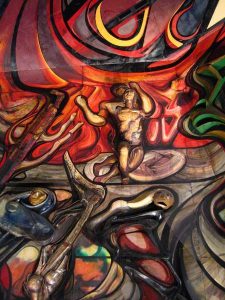Humanity is
the start of the race; I say
Humanity is the mold to break away from, the crust to break through, the coal to break into fire,
the atom to split.
Robinson Jeffers
Fittingly, at the end of this annus horribilis, I’m reading “Robinson Jeffers, The Poet of California,” a biography by a local professor, James Karman. In the 1920’s, Jeffers’ poetry was considered “unsurpassed by any other poet writing today in English,” in the words of a leading reviewer of the time, “equaled only by the very great,” added another from the New York Times.
Writing in the wake of World War I, Jeffers felt he was literally and metaphorically standing at the end of Western civilization in Hawk’s Tower, which he built with his own hands. The four-story granite addition to Tor House, in now moneyed Carmel, sits at the edge of the continent overlooking the Pacific, on a site favored by Native Americans for thousands of years.
It is noteworthy that Jeffers built his famous house on top of an Indian midden, which is the term archeologists use for ancient garbage heaps. To a large extent, he saw humankind that way, which is perhaps why, shortly after he suddenly became famous, he just as quickly fell into obscurity.
Jeffers was not a cynic however. A cynic is a person who stands apart from the humanity he derides, feeling, in his derision, superior to that from which he is inseparable.
Though I had read some of Jeffers poetry when I was young, and was deeply moved by his vision of humanity, much of it is new to me. There is a great deal with which I feel deep congruence, although Jeffers’ approach was to diminish humankind to the point of insignificance, rather than try to resolve ‘the riddle of man.’ As such, he was one of the first proponents of the ‘specks on a speck in space’ worldview.
Jeffers was correct when he wrote,
…don’t be fooled—
It is all truly one life, red blood and tree sap,
Animal, mineral, sidereal, one stream, one organism,
one God.
His conception of God strikes a deep chord in any mystic, which Jeffers certainly was, though one of the harshest kind.
God is a hawk gliding among the stars—
If all the stars and the earth,
and the living flesh of the night that
flows in between them,
and whatever else is beyond them,
Were that one bird.
Not being content to leave things there, he added in the same poem, “The Double Axe:”
He has a bloody beak and harsh talons,
he pounces and tears…
Jeffers drives home his view in another poem, “At the Birth of an Age:”
He has no righteousness,
no mercy, no love.
Jeffers would mock, with his indomitable poetry, the words of Harvard’s chaplain, Reverend Peter J. Gomes: “Jesus cares, God cares about this world, and is determined to help us do something about it.” Such sentiments deserve mocking, for there is no God that cares about us, only God that cares through us. Even so, Jeffers’ God is one that has no place for Jesus, no matter how we understand him.
It is simply not enough to say “On other globes/ Throughout the universe, much greater nerve endings” of the universe are being born. We are the nerve endings of the universe on this beautiful planet, and until the collective human heart becomes a cinder, there is still a chance to realize, in the words of Elijah, that “the god who answers with fire is God indeed.”
Jeffers felt the infinite emptiness of being, but didn’t see the relationship between God (which was the universe as a whole to his mind), and the finite dimension of being, much less the dreadful world of man.
Human beings are the finite expressions, in individual form, of the infinite energy, wholeness, and mystery of the universe. We can consciously touch the ground of death and life from which this and all universes spring.
Are we to believe that such mystery has no meaning in its apprehension, no love in its labor, and no mindfulness in its mechanisms?
No, meaninglessness is far more irrational than the dawning of cosmic meaning that our groping minds comprehend through the fog of knowledge. This world, as all previous worlds of history and prehistory, may well end badly, with our children’s children’s children forgetting that we ever existed, except to shake their heads in disgust and dismay, sorrow and sadness.
This age may even mark the beginning of a long deterioration of human life on this marvelous earth. But as long as the flame of life and light burns in some anonymous corner of the human heart, the human being will stand, even if the human experiment fails.
Should that day come, and our resilient species, having plundered the earth, is unable to be resilient anymore, Life will go on. And as sure as there is life, other sentient, potentially harmonious species will make the turn, through transmutation, that humankind is refusing to make.
That day has not come, though this year has brought us closer to it, despite, indeed in part because of all the empty talk of a shift in consciousness. Hope for nothing; prepare for the worst…and the best.
Martin LeFevre
Humanity is
the start of the race; I say
Humanity is the mold to break away from, the crust to break through, the coal to break into fire,
the atom to split.
Robinson Jeffers
Fittingly, at the end of this annus horribilis, I’m reading “Robinson Jeffers, The Poet of California,” a biography by a local professor, James Karman. In the 1920’s, Jeffers’ poetry was considered “unsurpassed by any other poet writing today in English,” in the words of a leading reviewer of the time, “equaled only by the very great,” added another from the New York Times.
Writing in the wake of World War I, Jeffers felt he was literally and metaphorically standing at the end of Western civilization in Hawk’s Tower, which he built with his own hands. The four-story granite addition to Tor House, in now moneyed Carmel, sits at the edge of the continent overlooking the Pacific, on a site favored by Native Americans for thousands of years.
It is noteworthy that Jeffers built his famous house on top of an Indian midden, which is the term archeologists use for ancient garbage heaps. To a large extent, he saw humankind that way, which is perhaps why, shortly after he suddenly became famous, he just as quickly fell into obscurity.
Jeffers was not a cynic however. A cynic is a person who stands apart from the humanity he derides, feeling, in his derision, superior to that from which he is inseparable.
Though I had read some of Jeffers poetry when I was young, and was deeply moved by his vision of humanity, much of it is new to me. There is a great deal with which I feel deep congruence, although Jeffers’ approach was to diminish humankind to the point of insignificance, rather than try to resolve ‘the riddle of man.’ As such, he was one of the first proponents of the ‘specks on a speck in space’ worldview.
Jeffers was correct when he wrote,
…don’t be fooled—
It is all truly one life, red blood and tree sap,
Animal, mineral, sidereal, one stream, one organism,
one God.
His conception of God strikes a deep chord in any mystic, which Jeffers certainly was, though one of the harshest kind.
God is a hawk gliding among the stars—
If all the stars and the earth,
and the living flesh of the night that
flows in between them,
and whatever else is beyond them,
Were that one bird.
Not being content to leave things there, he added in the same poem, “The Double Axe:”
He has a bloody beak and harsh talons,
he pounces and tears…
Jeffers drives home his view in another poem, “At the Birth of an Age:”
He has no righteousness,
no mercy, no love.
Jeffers would mock, with his indomitable poetry, the words of Harvard’s chaplain, Reverend Peter J. Gomes: “Jesus cares, God cares about this world, and is determined to help us do something about it.” Such sentiments deserve mocking, for there is no God that cares about us, only God that cares through us. Even so, Jeffers’ God is one that has no place for Jesus, no matter how we understand him.
It is simply not enough to say “On other globes/ Throughout the universe, much greater nerve endings” of the universe are being born. We are the nerve endings of the universe on this beautiful planet, and until the collective human heart becomes a cinder, there is still a chance to realize, in the words of Elijah, that “the god who answers with fire is God indeed.”
Jeffers felt the infinite emptiness of being, but didn’t see the relationship between God (which was the universe as a whole to his mind), and the finite dimension of being, much less the dreadful world of man.
Human beings are the finite expressions, in individual form, of the infinite energy, wholeness, and mystery of the universe. We can consciously touch the ground of death and life from which this and all universes spring.
Are we to believe that such mystery has no meaning in its apprehension, no love in its labor, and no mindfulness in its mechanisms?
No, meaninglessness is far more irrational than the dawning of cosmic meaning that our groping minds comprehend through the fog of knowledge. This world, as all previous worlds of history and prehistory, may well end badly, with our children’s children’s children forgetting that we ever existed, except to shake their heads in disgust and dismay, sorrow and sadness.
This age may even mark the beginning of a long deterioration of human life on this marvelous earth. But as long as the flame of life and light burns in some anonymous corner of the human heart, the human being will stand, even if the human experiment fails.
Should that day come, and our resilient species, having plundered the earth, is unable to be resilient anymore, Life will go on. And as sure as there is life, other sentient, potentially harmonious species will make the turn, through transmutation, that humankind is refusing to make.
That day has not come, though this year has brought us closer to it, despite, indeed in part because of all the empty talk of a shift in consciousness. Hope for nothing; prepare for the worst…and the best.
Martin LeFevre




Comments are closed.